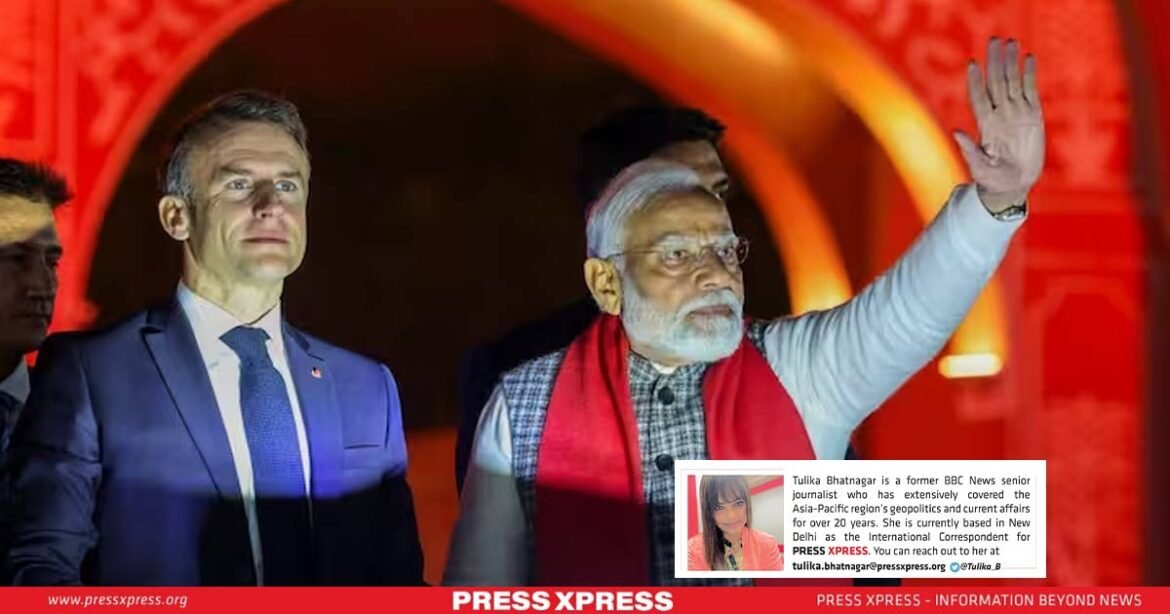As India celebrated its 75th Republic Day on 26 January 2024, marking the adoption of the constitution in 1950, the spotlight was largely fixed on the country’s deepening ties with France.
French President Emmanuel Macron attended the ceremony as the chief guest. Six months earlier, Indian Prime Minister Narendra Modi was the chief guest at France’s Bastille Day on 14 July 2023.
You can also read : France and Bangladesh Forge a Brighter Bond!
The mutual invites signify not only the importance of bilateral relations but also heighten the geopolitical context of the Indo-Pacific and the Indian Ocean region.
Even during the G20 summit, President Macron and PM Modi held several meetings and conversations on issues of mutual concern. The Republic Day visit has also come with several strategic announcements.
Defence Industrial Roadmap
To begin with, India and France have announced a “defence industrial roadmap”. At a time when India is keen to modernise its defence production, it’s a welcome development to have France offer its state-of-the-art defence technology.
The roadmap, set up till 2047, will facilitate joint development and manufacturing of advanced military equipment and another for defence space cooperation. There is an additional agreement on joint production of civil helicopters by India’s Tata and France’s Airbus.
France has already delivered 36 Rafale fighter aircraft to the Indian Air Force. The country is also supplying 26 maritime versions of the Rafale-M to the Indian Navy. In the pipeline is also a multi-billion-dollar deal to supply three additional Scorpene-class conventional submarines.
According to India’s Foreign Secretary Vinay Kwatra, the focus and priority of the defence roadmap is to identify more such opportunities and “prioritize co-designing, co-development, co-production and also build the defence supply chains between the two countries”.
Giving details of the roadmap at a press briefing, Kwatra said the domains of collaboration and opportunities will range between “aircraft to land and maritime warfare, especially underwater domain awareness, to space, robotic technology, cyber-defence, and artificial intelligence-led vehicles”.
25 Years of Bonding
India’s first-ever strategic partnership was with France, signed on 26 January 1998.
Twenty-five years later, the French President’s visit is also significant because of the two leaders’ shared preference for a multipolar international order.
Both Macron and Modi play the balancing role as autonomous, independent leaders – rather than mere followers – of Europe and Global South respectively.
Respect for sovereignty is at the core of the India-France ties.
That means the external policy communication of the two countries remains silent on internal incidents – unlike the way the Western nations comment on press or religious freedoms or transparency of elections.
Other areas of strong cooperation are going to be academics and sports. President Macron has also expressed his country’s support in India’s bidding for hosting the Olympics in 2036. Paris is hosting the 2024 Olympics in July and August this year.
In the area of academics, nearly 30,000 Indian students will have the opportunity to study in French universities till 2030. The French language learning centre will see its network expand in India rapidly, while visa processes will be facilitated for former Indian students who studied in France.
This was Macron’s third visit to India and the seventh time he met Indian PM Modi since 2023.
Notably, it’s also the sixth time a French President has been invited to Republic Day – the maximum number for any country.
It’s a clear reflection of how both Macron and Modi are attaching importance to working together to provide a strategic direction to the mutual ties in an ever-changing world order.


